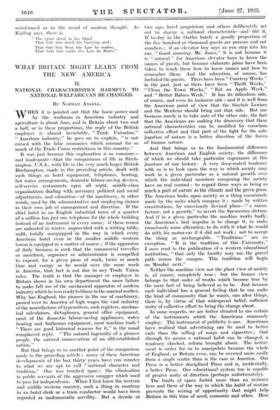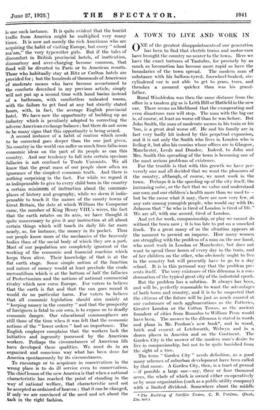WHAT BRITAIN MIGHT LEARN FROM THE NEW AMERICA II.
NATIONAL CHARACTERISTICS HARMFUL TO NATIONAL WELFARE CAN BE CHANGED.
BY NORMAN ANGELL.
V HEN it is pointed out that the horse power used by the workman in American industry and agriculture is about four, and in Britain about two and a half, or in these proportions, the reply of the British employer is almost invariably, " Trade Unionism." " American industry," he goes on to explain, " is not cursed with the false economics which account for so much of the Trade Union restrictions in this country." It was just because this explanation is so common— and inadequate—that the comparisons of life in Birch- ampton, U.S.A., with life in the very much larger British Birehampton, made in the preceding article, dealt with such things as hotel equipment, telephones, heating, hot water arrangements, domestic labour-saving devices, self-service restaurants open all night, middle-class organizations dealing with necessary political and social adjustments, and education—of the machinery, in other words, used by the administrative and employing classes in their own job of management and direction. If the chief hotel in an English industrial town of a quarter of a million has just one telephone for the whole building instead of an instrument in every room ; if these rooms are unheated in winter, unprovided with a writing table, unlit, totally unequipped in the way in which every American hotel even in the smaller middle western towns is equipped as a matter of course ; if the apparatus of daily business is such that the commercial traveller or merchant, organizer or administrator is compelled to expend, for a given piece of work, twice as much time and energy as he would over the same work in America, that fact is not due to any Trade Union rules. The truth is that the manager or employer in Britain shows in his own department the same failure to make full use of the mechanical apparatus of modern industry which he is so readyto blame in the manual worker. Why has England, the pioneer in the use of machinery, passed over to America of high wages the vast industry of the manufacture of typewriters, cash registers, mechan- ical calculators, dictaphones, general office equipment, most of the domestic labour-saving appliances, water heating and bathroom equipment, most machine tools ? " There are good historical reasons for it," is the usual complacent reply. " The natural ingenuity of a pioneer people, the natural conservatism of an old-established nation."
But that brings us to another point of the comparison made in the preceding article : many of these American developments of the last thirty years have run counter to what we are apt to call " national character and tradition." One was touched upon : the elimination in public servants of the aggressive swagger which used to pass for independence. When I first knew the western and middle 'western country, such a thing as courtesy in an hotel clerk or a train conductor would have been regarded as undemocratic servility. But a decade or two ago, hotel proprietors and others deliberately set out to change a national characteristic—and did it. If to-day in the Statler hotels a goodly proportion of the five hundred or thousand guests arc persons and not numbers ; if an elevator boy says as you step into his car, ." Good morning, Mr. Jones," it is not because it is " natural " for American elevator boys to know the names of guests, but because elaborate pains have been takedto teach them how to know names and how to remember them. And the education, of course, has included the guests. There have been " Courtesy Weeks " in the past, just as there have been " Thrift Weeks,' " Clean the Town Weeks," " Eat an Apple Week," and " Better Babies Week." It has its ridiculous side, of course, and even its insincere side ; and it is well from- the American point of view that the Sinclair. Lewises and the Menkens should bring out that side. But our business surely is to take note of the other side, the fact that the Americans are making the discovery that these national characteristics can be modified by conscious collective effort and that part of the fight for the sub- jugation of nature is a better direction of the forces of human nature.
And that brings us to the fundamental difference between American and English society, the difference of which we should take particular cognizance at this juncture of our history. A very deep-seated tendency with us is to look upon the way in which society may work in a given particular as a natural growth over which the individual members composing the society have no real control : to regard those ways as being as much a part of nature as the climate and the green grass. The American looks upon society as a thing consciously made by the units which compose it ; made by written constitutions, by consciously devised plans—" a manu- facture, not a growth," to invert the Spencerian dictum.' And if in a given particular the machine works badly, the American's first impulse is to change it, to make consciously some alteration, to do with it what he would do with his motor-car if it did not work ; not to accept the thing as unchangeable. " Traditions " are no exception. " It is the tradition of this University," I once read in the publication of a western educational institution, " that only the faculty may use the gravel path across the campus. This tradition will begin on Monday next."
Neither the machine view nor the plant view of society is, of course, completely true ; but the former view belongs to that order of truths which become true by the mere fact of being believed so to be. Just because each individual has a general feeling that he can make the kind of community that he wants, can alter things, there is, by virtue of that widespread belief, sufficient unity of collective effort to bring the change about.
In some respects, we are better situated to use certain of the instruments which the Americans commonly employ. The instrument of publicity is one. Americans have realized that advertising can be used to better ends 'than the selling of soaps and cigarettes ; that through its means a national habit can be changed, a tendency checked, reform brought about. The instru- ment is easier for us to manipulate because the whole of England, or Britain even, can be covered more easily from a single centre than is the case in America. Our Press is a better disciplined Press and is, incidentally, a better Press. Our educational system too is capable of greater unity of direction (perhaps unfortunately).
The limits of space forbid more than an instance here and there of the way in which the habit of routine prevents the seizing of opportunity that might help Britain in this time of need, economic and other. Here is one such instance. It is quite evident that the tourist traffic from America .might be multiplied very many m times. It. is now not merely the rich Americans who are acquiring the habit of visiting Europe, but every " school ma'am," the very typewriter girls. But if the tales of discomfort in British provincial hotels, of inattention, discourtesy and over-charging become- common, that flood will be diverted to Paris or to American resorts. Those who habitually stay at Ritz or Carlton hotels are provided for ; but the hundreds of thousands of Americans of moderate means who have become accustomed to the comforts described in my previous article, simply will not put up a second time with hand basins instead of a bathroom, with comfortless unheated rooms, with the failure to get food at any but strictly stated hours, with, in fact, the average English provincial hotel. We have now the opportunity of building up an industry which is peculiarly adapted to correcting the adverse American exchange balance ; but there do not seem :to be many signs that this opportunity is being seized. A second instance of a habit of routine which needs to be corrected goes deeper than the one just given. No country in the world can suffer so much from fallacious economic ideas on the part of its people as can this country. And our tendency to fall into certain specious fallacies is not confined to Trade Unionists. We all know that the great mass of our people show often an ignorance of the simplest economic truth. And there is nothing surprising in the fact. For while we regard it as indispensable to give to every child born in the country a certain minimum of instruction about the common- places of history and geography, while we deem it indis- pensable to teach it the names of the county towns of Great Britain, the date at which William the Conqueror came, the number of King Henry VIII.'s wives, the fact that the earth rotates on its axis, we have thought it quite unnecessary to give it any instruction at all about certain things which will touch its daily life far more nearly, as, for instance, the money in its pocket. Thus our people know more of the mechanics of the heavenly bodies than of the social body of -which they are a part. Most of our Population are completely ignorant of the working of the economic and financial machine which keeps them alive. Their knowledge of that is at the flat earth stage. Some simple notion of the function and nature of money would at least preclude the crude mercantilism which is at the bottom of half the fallacies of Protectionism and the notions of national commercial rivalry which now curse Europe. For voters to believe that the earth is flat and that the sun goes round it would - do- no particular harm. For voters to believe that all economic legislation should aim mainly at " keeping money in-the country " and that the prosperity of foreigners is fatal to our own, is to expose us to deadly economic danger. Our educational commonplaces are still thcise of thetime when it was felt that the economic notions of the " lower orders " had no importance. The Englith employer complains that the workers lack the initiative and ingenuity possessed by the American workers. Perhaps the circumstances of American life have developed these qualities. We must do in an organizkd and conscious way what has been done for America spontaneously by its circumstances.
To encourage or to acquiesce in conservatism in the wrong place is to do ill service even to conservatism. The chief lesson of the new America is that when a national characteristic has reached the point of standing in the way of national welfare, that characteristic need not be accepted as ordained of heaven ; that it can be changed, if only we are convinced Of the need and set about the :task in the right fashion.











































 Previous page
Previous page